Dolly Parton's Heartstrings: The true story behind every episode on Netflix
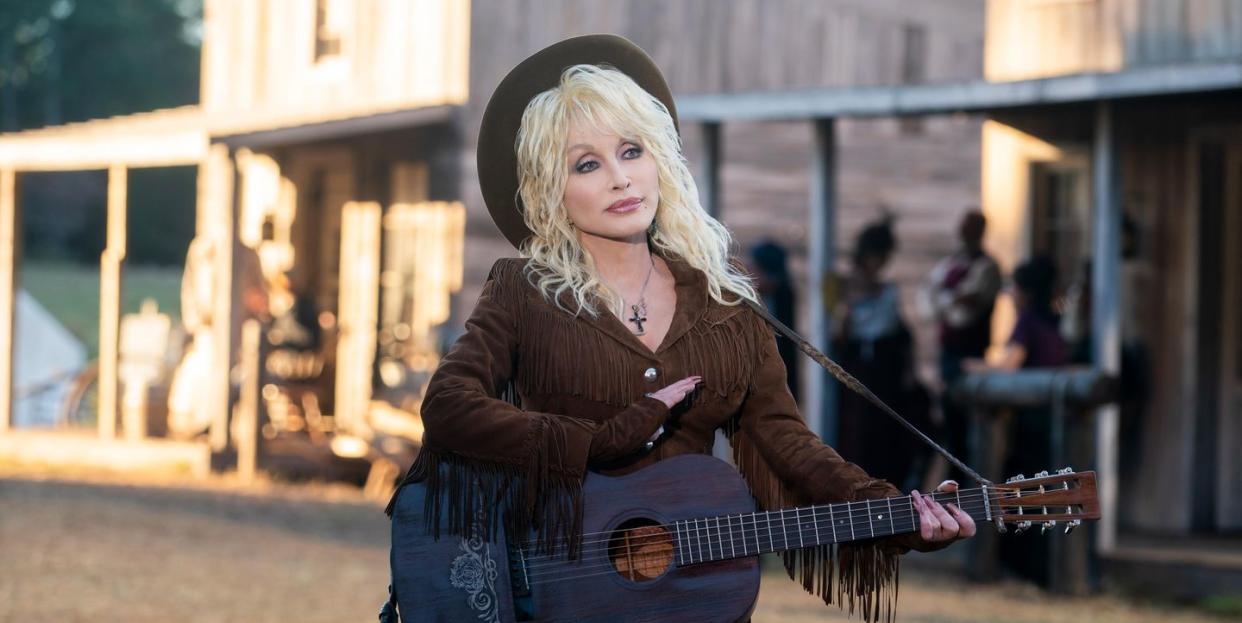
Dolly Parton's family couldn't afford a TV or trips to the cinema when she was growing up, so she started telling stories of her own instead. At the age of four or five, the future diva wrote her first song about Tiny Tasseltop, her little corncob doll, and in the seven decades that have passed since, she's written countless more songs that tug on our… wait for it… heartstrings.
It's only fitting then that the Backwoods Barbie would finally bring some of her timeless music to life in a new anthology series called Dolly Parton's Heartstrings. Dolly herself produced the show in collaboration with Netflix, and she also appears in all eight episodes, introducing the story each time and even acting in a couple as well.
Some song choices might surprise casual Dolly fans expecting to see the likes of '9 To 5' or 'I Will Always Love You', but the goal here was to tell a more diverse range of stories that tug on different heartstrings each time.
Come watch the kind of wholesome entertainment we all hanker for at this time of year as we explain the real-life stories and inspiration behind each song featured in Dolly Parton's new show.
Cracker Jack
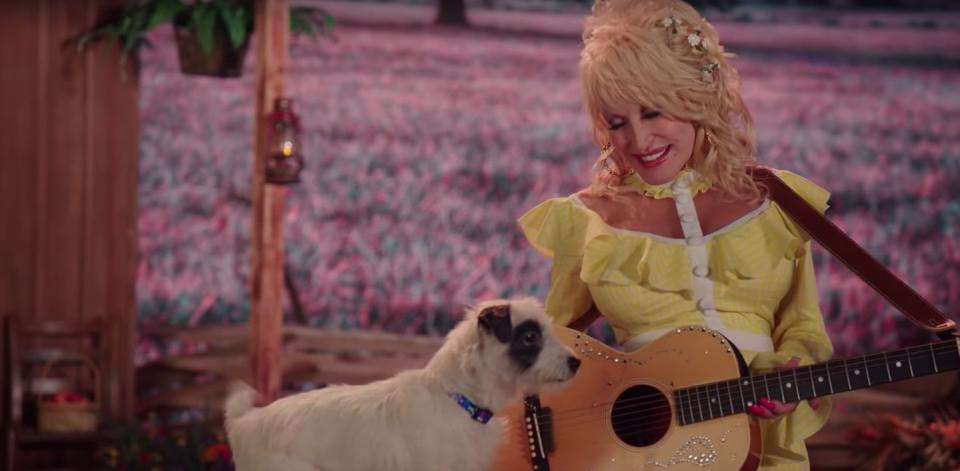
The 'Cracker Jack' episode of Heartstrings revolves around the unconditional love shared between a little girl and her dog, just like the song itself, which makes this perhaps the most literal interpretation of Dolly's music.
This deep cut from Dolly's Jolene album first came out in 1974 and like most of her songs, it's autobiographical. When Parton was young, she too owned a dog called Cracker Jack, just like the girl in this episode. Other dogs came and went, but as Dolly points out in this episode's introduction, "there was this one special dog that meant so much to all of us little kids."
Parton goes on to say, "It's no coincidence that dog is God spelled backwards... because they love you unconditionally." There's nothing more wholesome and cute than a child's love for their dog, which makes 'Cracker Jack' the perfect introduction to Dolly's whole Heartstrings anthology.
Down From Dover
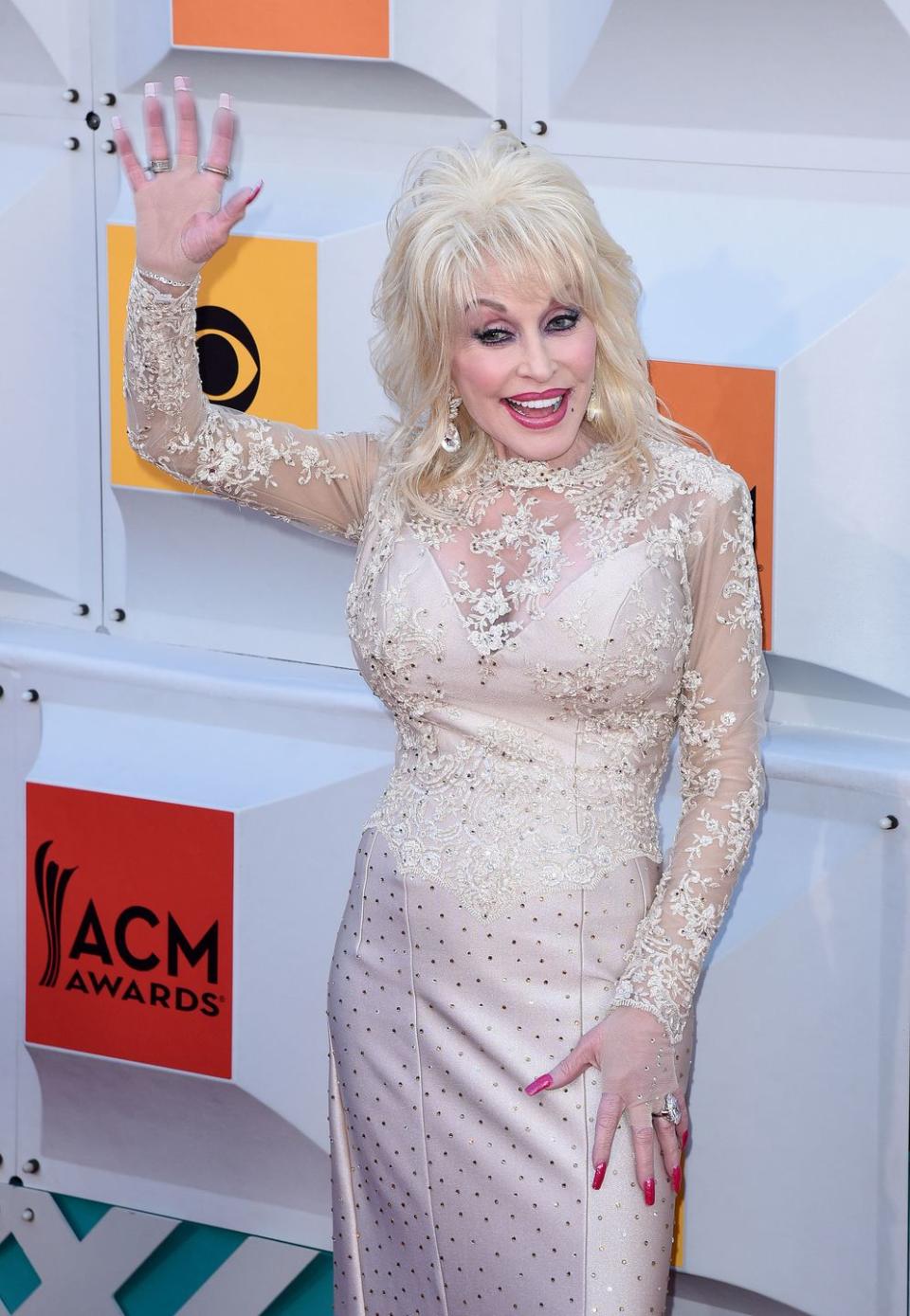
Never afraid to stand up for what she believes in, Dolly wrote this controversial song way back in 1970, telling the story of an unmarried, pregnant teenager who's forced to leave home.
Regular collaborator Porter Wagoner warned Parton that recording the likes of Down From Dover could have a negative impact on her career, but Dolly carried on anyway, and as she points out at the beginning of the episode, it "became one of my most important songs."
"Now the message here is that hope and love are the greatest forces there are. And if you have hope, you can survive prejudice, you can survive separation, you could even survive unspeakable loss."
If I Had Wings
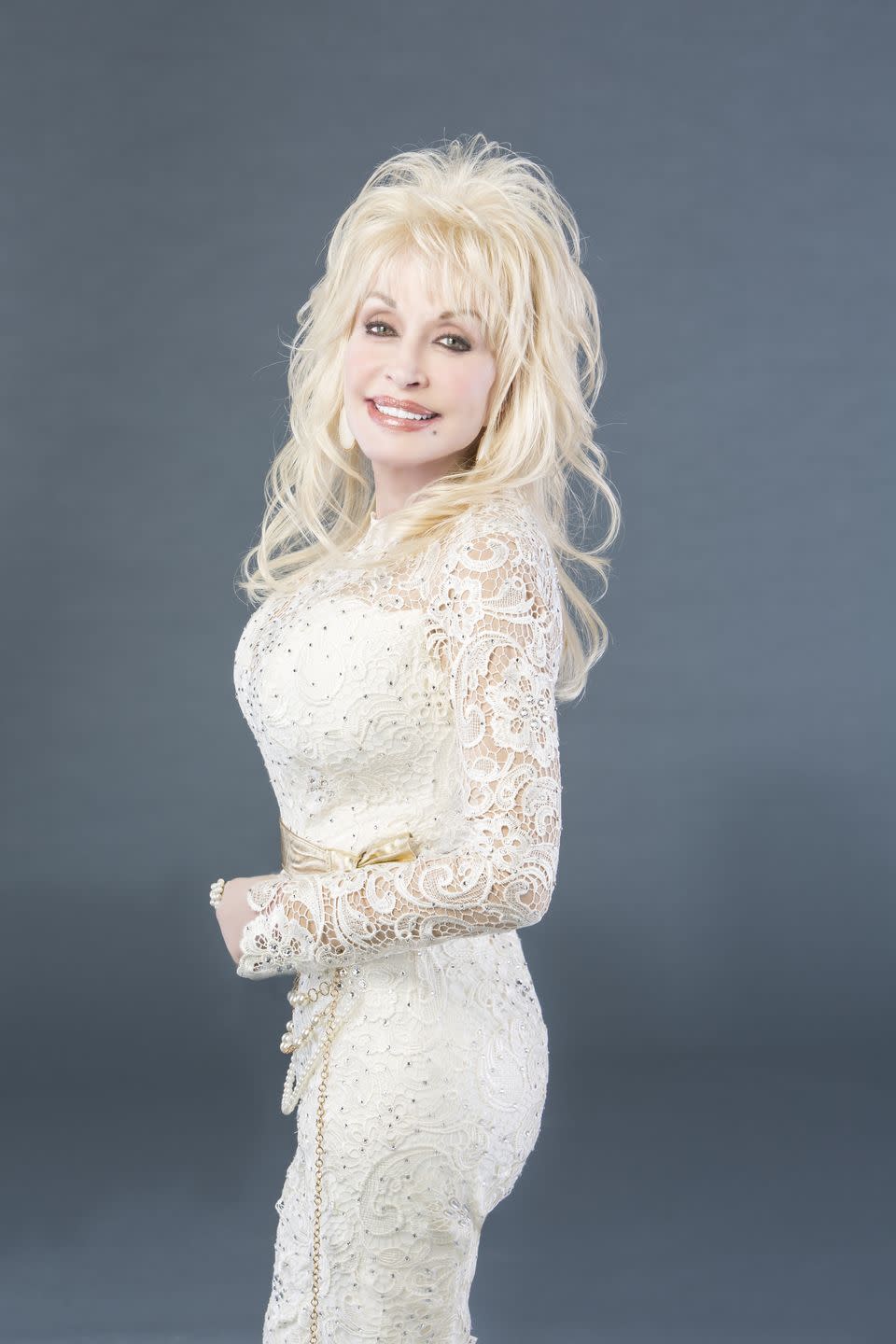
A quick visit to Parton's official website reveals that the album If I Had Wings comes from was inspired by the Smoky Mountains, Dolly's favourite place in the entire world.
"It was a song that brought me out of the Smoky Mountains and it will be a song that lays me back down in the ground in the Smoky Mountains."
The episode that's based on this song follows three siblings as they attend their estranged father’s birthday and confront the past together. At the beginning, Dolly reveals that If I Had Wings often reminds her of the old mountain songs her mother, Avie Lee Parton, used to sing:
"Those songs were stories of sadness and struggle, but they also had dreams in them of what might be. My mama believed in dreams, especially mine, and I've learned in my life that dreams don't just come true by themselves."
JJ Sneed
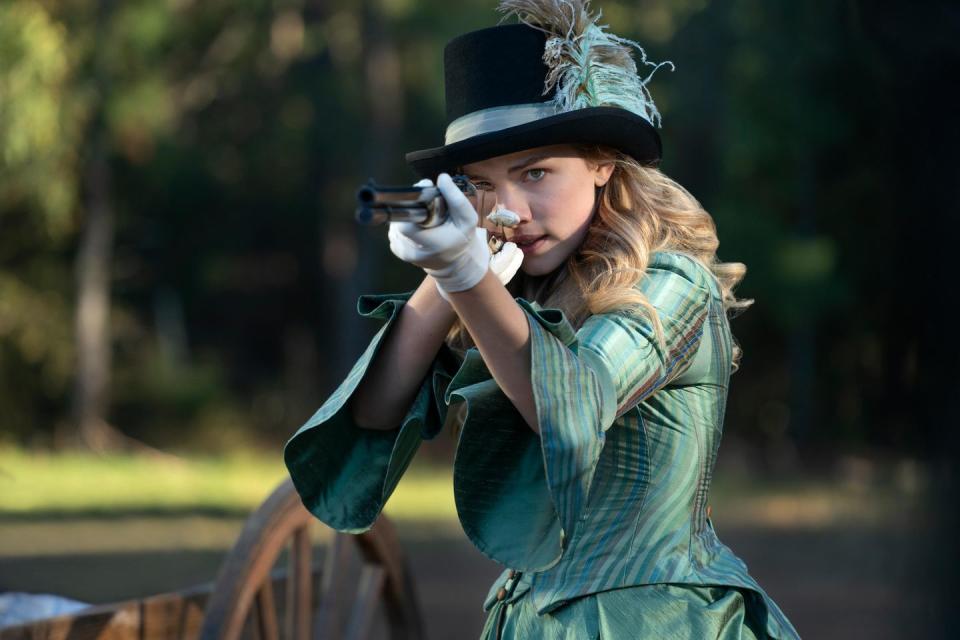
First released back in 1971, the song 'JJ Sneed' inspired the Heartstrings team to dive even further back to the 1880s, telling the story of a young woman who breaks free of that era's constraints to live the life of an outlaw.
Inspiring, powerful women are a regular fixture in Dolly's music, and this desire to celebrate their achievements stems from her childhood. More than once, Parton has mentioned that something always bugged her about the Westerns she'd watch in her youth, and she discusses this in more detail at the beginning of JJ Sneed.
"I noticed something missing from these epic battles between good and evil, the women. they were always damsels in distress, and you rarely got to see the ones holding a gun. So I thought there ought to be a story where the women are just as rough and tumble as the men."
Jolene

Given how famous 'Jolene' is, we wouldn't be surprised if most viewers skip to this episode first, but despite the song's prominence, the story behind it is more convoluted than some fans might realise.
The line "I'm beggin' of you/Please don't take my man" has given Jolene a bad rep over the years, but in truth, the song never actually says she's a home-wrecker. Showrunner Patrick Sean Smith was keen to point this out to TV Insider, explaining that this is why Julianne Hough's character is portrayed in a more positive light than some might expect.
In reality, 'Jolene' was based on two separate people in Dolly's life. The idea of a woman seducing Dolly's man came to her early on in her marriage with Carl Thomas Dean when a red-haired bank teller flirted with him.
In a 2008 NPR interview, Dolly said: "She had everything I didn't, like legs—you know, she was about 6 feet tall. And had all that stuff that some little short, sawed-off honky like me don't have."
There's no need to worry though. Dolly and Dean have been happily married since 1966, and she even joked recently to the LA Times that people always assume the worst when it comes to 'Jolene':
"My husband’s people were just so scared I was going to tell this old story about me and Carl [laughs]. Of course, I always exaggerated that story."
The second woman who inspired 'Jolene' wasn't a woman at all. During an early concert, Dolly met a young girl in the autograph line whose name was Jolene:
"I said, 'Well, you're the prettiest little thing I ever saw. So what is your name?' And she said, 'Jolene'. And I said, 'Jolene... That is pretty. That sounds like a song. I'm going to write a song about that.'"
Sugar Hill
Eight stories inspired by eight Dolly classics come to life in "Dolly Parton's Heartstrings". Had an absolute blast making this and can't wait for you to see our episode, "Sugar Hill". Premieres November 22nd, only on Netflix. #dollynetflix @DollyParton @VirginiaGardner pic.twitter.com/UxTGX2iwRs
— Tom Brittney (@tombrittney) November 5, 2019
'Sugar Hill' reunites two co-stars from the ABC '80s drama Thirtysomething, following a married couple (Timothy Busfield and Patricia Wettig) who take a road trip back to where their relationship first began.
Back when the song was first recorded in 2002, Dolly revealed that 'Sugar Hill' was actually named after the record company who she recorded it with: "Every time I'd look at my record company's label, I'd think, 'Sugar Hill, now that's a really pretty name.'"
Of course, Dolly puts a more romantic spin on this story at the beginning of the episode:
"I've been lucky enough to be with the man I love for over fifty years... and I'm excited to share this beautiful story about a couple looking back on their journey together. Their love is a love for the ages, and it all started in a magical little place called Sugar Hill."
These Old Bones
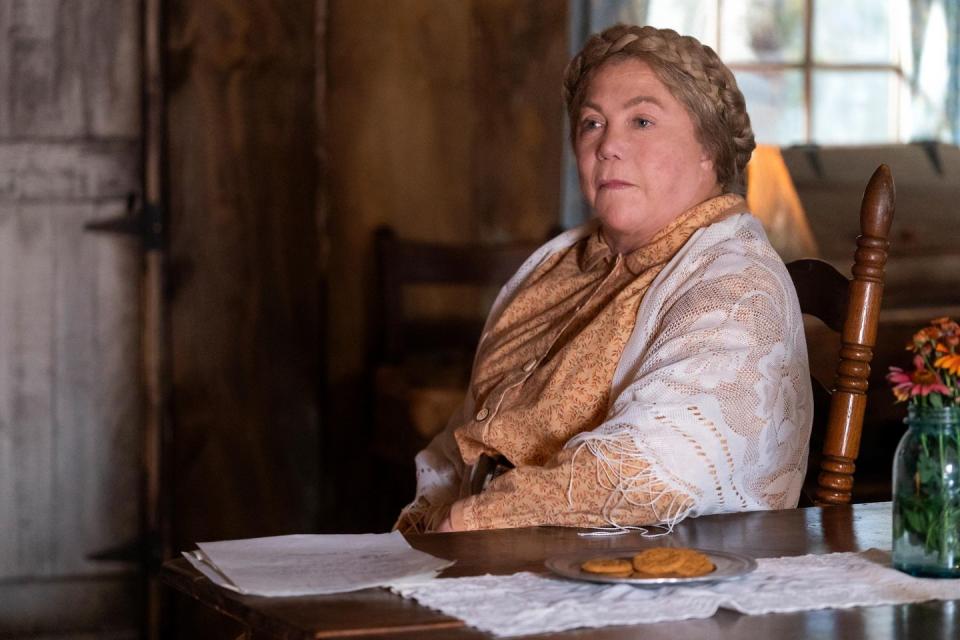
'These Old Bones' takes Heartstrings into supernatural territory, telling the story of an old mountain woman, played by Kathleen Turner, who can predict the future.
While the Dollymania fan page claims that her 'Bones' character first came about when a younger Dolly used to mimic her mother, Dolly herself reveals at the beginning of this episode that Bones was actually based on a real person:
"[Bones] lived alone up in the mountains and she carried a pouch full of animal and bird bones. Now, they would tell her things, kind of like reading tea leaves, and she could see things that regular people couldn't see."
"She had the gift of clairvoyance and she even told me once that I was anointed... It meant I was going to do big things someday, and that I had a special gift I needed to share with the world. I took that serious, and I was humbled she was right."
Two Doors Down

Officially one of Dolly's favourite songs ever, 'Two Doors Down' is one of the defining party anthems of her career, but there's also a lot of heartbreak in the lyrics too, which Heartstrings echoes in an episode of the same name.
Andy Mientus stars as a gay man who's forced to confront some hard truths during his sister's New Year's Eve wedding, painfully clashing with his mother (played by Oscar winner Melissa Leo).
Although Two Doors Down might seem like a simple party song, it's actually far more layered than that, declaring love is love decades before the phrase found its footing in the LGBTQ+ community. Dolly herself reveals in this episode how her road family inspired her to write this song in 1977, a family which included "all kinds of people."
"Different colours, gay, lesbian, transgender and all different faiths... it didn't matter, as long as we got along... What it all comes down to is love is love, in road families and real families. Life might not always be a party, but you're better off if you can just enjoy yourself and accept and love the people around you."
Dolly Parton's Heartstrings is available to watch on Netflix on November 22.
Digital Spy now has a newsletter – sign up to get it sent straight to your inbox.
Want up-to-the-minute entertainment news and features? Just hit 'Like' on our Digital Spy Facebook page and 'Follow' on our @digitalspy Instagram and Twitter accounts.
You Might Also Like

